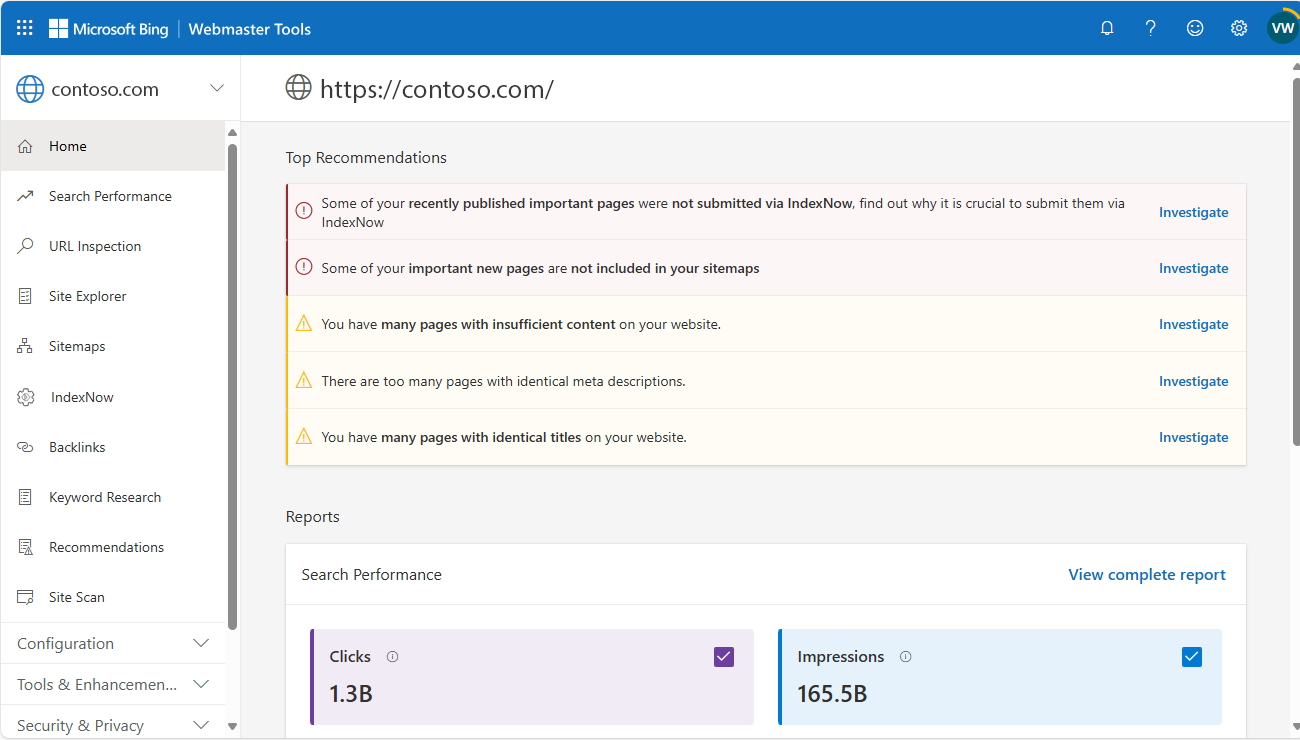Microsoft has updated Bing Webmaster Tools with a new feature called “Recommendations” aimed at improving website performance and is adding an AI Copilot. These improvements aim to provide website owners with data-driven insights to enhance their site’s SEO and visibility.
From Basic Insights to Actionable Data
Previously known as Insights, the new Recommendations feature isn’t just a rebranding. The latest upgrade expands its functionality and gives webmasters a much more detailed view of their site’s performance. It offers more than high-level data, delving deeper into specific metrics that can help pinpoint problem areas on your site.
Instead of just showing numbers, Recommendations provides actionable steps, which are tailored to what each site needs. This is a big deal for those managing websites on their own or with small teams—detailed analytics paired with practical advice.
Webmasters often struggle with keeping up with the constant need for optimization. Whether it’s a small blog or a massive e-commerce platform, website managers face the challenge of understanding their audience, optimizing content, and making quick decisions. That’s where Bing’s latest tool, Recommendations, comes in—it’s designed to cater to the needs of various types of websites.
An e-commerce store prepping for the holiday season, for example, might use the tool to ensure it’s ready for a surge of traffic. Meanwhile, a blog owner can use it to understand which posts resonate most with readers and adjust content strategies accordingly. Large companies with sprawling websites will also benefit from data that helps them ensure consistency and performance across regions.


Real-Time SEO Suggestions and Tailored SEO Advice
What makes this tool stand out is its ability to provide real-time data, a crucial advantage in fast-moving industries like digital marketing. By offering continuous updates, it allows webmasters to act quickly based on the most current data available. This is particularly useful during busy periods when site performance needs to be spot on.
On top of that, the tool breaks down the numbers in a way that’s easy to understand. Whether it’s fine-tuning your keyword usage or refining your backlink strategies, the tool digs into the details that matter. For businesses looking to improve their site’s performance, having this level of granular data is a major advantage.
The Recommendations feature doesn’t just leave you with numbers. It goes further by giving step-by-step advice on how to improve your search rankings. This includes everything from optimizing keywords to adjusting your content structure. It’s like having an SEO consultant, minus the hefty fees.
This can be especially useful for webmasters who aren’t SEO experts but still want to improve their rankings. By following the tool’s suggestions, you can start seeing improvements without needing to hire an outside expert.
AI Copilot Brings New SEO Insights to Bing Webmaster Tools
Bing’s newest update to its Webmaster Tools includes AI-powered Copilot. By providing instant help and smart suggestions, Copilot is designed to change how webmasters approach search optimization. The new tool, available only to select users for now, aims to automate parts of the SEO process, making it easier for site managers to focus on more creative work.
Rather than getting bogged down in routine tasks, Copilot offers answers and solutions in real time. Questions about site performance or SEO strategies? The built-in Real-Time Q&A is there to help out, making it easier for users to quickly understand and solve problems. This tool allows webmasters to speed up their workflow, letting them shift focus to other key parts of their website without being stuck in tedious data analysis.
Deep Data Insights is another feature that sets Copilot apart. Webmasters get a clear breakdown of their website’s key performance indicators, making decision-making faster and smarter. While Copilot takes care of analyzing the data, users can easily apply the insights without spending hours combing through reports.
It’s not just a standalone tool either. Copilot is tied to Microsoft’s larger ecosystem, linking up with Microsoft Advertising and Microsoft Clarity, a free analytics tool that provides website heatmaps, session recordings, and insights to give businesses a clearer picture of how to align their SEO strategy with overall marketing and performance goals. The integration helps users stay on top of every aspect of their digital presence, all from one place.
At this stage, Copilot isn’t widely available, with Microsoft restricting access to a small group of early testers. This group will play a role in shaping the future of the tool by providing feedback on what works and what doesn’t. Their real-world testing will influence the features and functionality before Copilot is released to the public.
Bing Expands Search Performance Data for Better Long-Term Insights
Along with the new Recommendations and Copilot features, Microsoft has also made a major change to its Search Performance tool in Bing Webmaster Tools. Webmasters now have access to 16 months of historical data, a significant increase from the previous 6-month window. This extension allows users to gain a broader understanding of long-term trends, seasonal shifts, and campaign performance over time.


It provides a detailed view of how previous strategies played out, helping users plan for future growth while addressing traffic fluctuations. Marketers can now better evaluate how their campaigns performed in the long run and adjust their approach to maximize future outcomes. Having this much historical data gives you the confidence to make more informed decisions.
With this extended view, businesses can also dig into seasonal trends, making it easier to adjust content and marketing strategies to take advantage of peak periods. Furthermore, the tool’s extended reporting capabilities allow teams to present a more comprehensive analysis to stakeholders, showcasing the impact of SEO efforts over a longer period.

